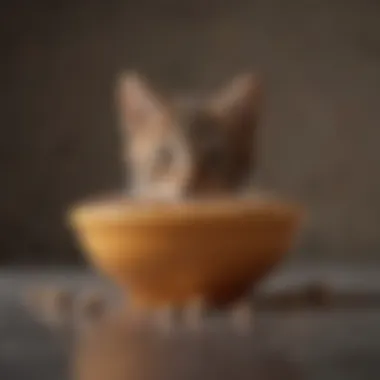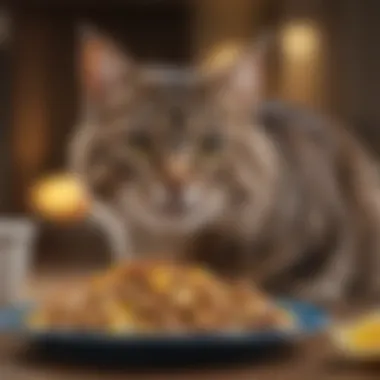Understanding the Duration for Which Cats Require Kitten Food


Intro
Cats undergo significant growth and development during their early stages of life. Providing the proper nutrition during this period is crucial. This section emphasizes the importance of understanding the dietary needs of kittens and how long they should remain on kitten food.
Pet Care Essentials
The core of your pet care strategy should revolve around meeting the specific nutritional needs of your growing cat. From age to various health factors, understanding these essentials can make a profound difference in their well-being.
Daily Nutrition Requirements
For a kitten, the right balance of proteins, fats, and carbohydrates is vital. Kittens need more calories per pound than adult cats due to their rapid growth. Feeding a high-quality kitten food that lists chicken, turkey, or fish as the primary ingredient is optimal.
Key nutrients to consider include:
- Protein: This is essential for growth and muscle development.
- Fatty Acids: Omega-3 and Omega-6 are crucial for healthy skin and coat.
- Calcium and Phosphorus: These minerals support the development of strong bones.
Exercise and Playtime
Kittens have high energy levels and an innate need to explore. Ensuring they have a variety of play opportunities is necessary for physical and mental stimulation. Interactive toys, such as feather wands and balls, can encourage activity.
Grooming Tips
Regular grooming is important, even for short-haired breeds. Brushing helps manage shedding and reduces matting in long-haired kittens. It is also a bonding activity that can enhance your relationship with your pet.
Health and Wellness Check-ins
Frequent veterinary check-ups during the kitten phase are essential. Early vaccinations, deworming, and discussions on nutrition should be a part of these visits. Keeping a record of their growth and any health concerns allows for better ongoing care.
Behavior & Training
Understanding a kitten's behavior goes hand in hand with providing proper nutrition. The first few months are not only about food but also about their environment and social integration.
Understanding Your Pet's Body Language
Kittens communicate a lot through body language. Recognizing their signals, whether it’s a swish of the tail or a kind of meow, can assist in establishing a more harmonious relationship.
Basic Training Techniques
Simple commands such as “sit” or “come” can be taught early. Positive reinforcement works well, using treats or affection as rewards for desired behaviors. Consistency is key to successful training.
Behavioral Concerns & Solutions
If a kitten exhibits signs of aggression or fear, understand that these behaviors often stem from insecurity. Creating a safe space and socializing with other pets can mitigate these reactions.
Socialization Tips
Introducing your kitten to various environments and people is crucial. Positive experiences during this period make for a more adaptable adult cat. Gradual exposure helps them feel comfortable in different situations.
Pet Home Environment
To provide the best care for your kitten, it is crucial to create an environment that promotes growth and well-being.
Creating a Pet-friendly Space
Designate areas in your home where your kitten can explore safely. Ensure that hazardous items are out of reach, and provide scratching posts to satisfy their instincts.
Safety Measures and Hazards to Avoid
Certain houseplants, like lilies and philodendrons, can be toxic to cats. Identifying and removing such hazards is vital.
Choosing the Right Toys and Accessories
Select toys that stimulate mental and physical activity. Avoid toys with small parts that can be swallowed and ensure all items are safe for your pet's age.
Setting Up a Comfortable Resting Area
Kittens require safe and cozy spots to rest. A soft bed in a quiet corner will provide the comfort they need for healthy sleep patterns.
Pet Health Issues


Recognizing health concerns early can lead to better outcomes. Monitoring your kitten for signs of distress or abnormal behavior is essential.
Recognizing Signs of Illness
Common indicators of illness include lethargy, lack of appetite, and unusual litter box behaviors. If any of these occur, contact your vet immediately.
Preventative Care Measures
Routine vaccinations, flea and tick prevention, and regular vet visits will help maintain health and longevity. Establishing a bespoke preventative care plan can lead to a happy, thriving cat.
Common Ailments and Treatments
Kittens can suffer from numerous issues like parasites or respiratory infections. Early detection and treatment are crucial for effective intervention.
Emergency Preparedness
Having a plan in case of emergencies is just as vital as routine care. Knowing the nearest veterinary clinics and preparing a pet first-aid kit can make all the difference.
Ensuring proper nutrition and care during the kitten stage lays the foundation for a healthy and balanced adult cat. Transitioning to adult food at the right time is essential for continued wellbeing.
Prologue to Cat Nutrition
Cat nutrition forms the foundation of a cat's health and well-being. It is not just about keeping your pet full; it is about providing the right balance of nutrients. Proper nutrition affects everything from growth rates to immune function. Understanding this topic is vital for any cat owner, especially during the kitten stage, where dietary needs are particularly critical.
When cats are young, they require a higher concentration of calories and specific nutrients to support their rapid growth and development. This means that the food they consume must be tailored to meet these elevated requirements. Near the end of the early growth stages, it's essential to make informed decisions about their diet to prevent issues with obesity or nutritional deficiencies later in life.
In this context, elements such as protein content, caloric density, and overall nutritional balance become key focal points. The right diet can also influence a cat's long-term health, shaping their likelihood of developing health issues as they age. Hence, knowledge on kitten nutrition is not just about the immediate; it is a building block for future health.
Importance of Proper Nutrition
Good nutrition has a profound impact on kittens. During their early life, they experience a variety of physiological changes. These changes demand a diet that is rich in essential nutrients.
- Growth and Development: Kittens grow rapidly within their first year. Proper nutrition supports this growth, allowing for optimal skeletal and organ development.
- Immune Support: A nutritious diet helps in building a robust immune system. Nutrients such as vitamins and minerals play a significant role in enhancing immunity.
- Cognitive Development: Fatty acids, particularly omega-3 and omega-6, are crucial for brain development and function. A balanced diet ensures that kittens can develop cognitively at an appropriate pace.
Understanding Cat Life Stages
Recognizing that cats pass through several life stages aids in grasping their nutritional needs over time. Each stage brings different requirements that reflect their evolving needs.
- Neonatal Stage: From birth until about four weeks, kittens rely solely on their mother’s milk, which is rich in antibodies and nutrients.
- Transitional Stage: Between four to eight weeks, cats begin to eat solid food. This is a vital time to introduce proper kitten food.
- Socialization Stage: This stage lasts from about two to nine weeks. Proper nutrition supports behavior development and learning.
- Juvenile Stage: From nine weeks until around six months, dietary requirements peak, making it essential to provide high-calorie foods.
In summary, understanding cat nutrition provides a holistic view of how to nourish your feline friend at various life stages, ensuring they lead a healthy and fulfilling life.
Kitten Development Stages
Understanding the various kitten development stages is critical in ensuring that young cats receive the appropriate nutrition. Each stage reflects significant changes in their physical, social, and emotional needs, which in turn affect the type of food they should consume. Kittens grow rapidly, and proper nutrition is fundamental during this period. This section breaks down the four key stages that most kittens go through: Neonatal, Transitional, Socialization, and Juvenile. These stages highlight the importance of adjusting dietary needs based on developmental milestones.
Neonatal Stage
The neonatal stage typically lasts from birth to around two weeks of age. During this time, kittens are totally dependent on their mother's milk or high-quality kitten milk replacer if fostered. Their development during this period is crucial, as they undergo significant growth, doubling their birth weight within the first week.
In this stage, kittens cannot regulate their body temperature or move very well. They require warmth and comfort provided mainly by their mother. Proper nutrition is vital for brain development, immune systems, and overall health. Without adequate feeding, their growth and health can be severely compromised.
Transitional Stage
The transitional stage lasts from about two to four weeks. Kittens begin to open their eyes and ears, marking the beginning of their interaction with the surroundings. They still need their mother's milk but they start to explore solid foods. It is during this stage that introducing high-quality wet or dry kitten food becomes important. Nutritional needs increase as they grow more active.
During this time, weaning starts, and using specialized kitten food can facilitate this process. Providing a proper diet helps establish good eating habits. Additionally, social interaction with littermates becomes vital for behavioral development.
Socialization Stage
From four weeks to about nine weeks, kittens enter the socialization stage. They become more mobile and curious about their environment. Social interactions with their mother and siblings, as well as human handlers, play a pivotal role in their behavioral development. Proper nutrition remains essential as they continue to grow and become more active.
At this point, kittens should be eating solid food primarily, while nursing may continue for a short while. A diet rich in protein and essential nutrients supports their growing bodies and developing immune systems. Encouraging positive interactions through feeding routines can help them be well-adjusted as they grow older.
Juvenile Stage
The juvenile stage encompasses the period from around nine weeks to six months. Kittens at this age are transitioning into full-grown cats. Their dietary needs at this stage focus on sustaining energy levels due to their high activity and continued growth.
At this point, all kittens should be consuming a balanced diet of high-quality kitten food. This food is designed to meet their increased caloric and protein needs. It is during this stage that they can also start developing their unique eating preferences, making it crucial to provide a variety of nutritious options.


Finally, monitoring growth and health during these stages is crucial to ensure that kittens are thriving. Attention to their nutritional needs and the transition to adult food at the appropriate time is vital for their well-being and development.
Nutritional Requirements of Kittens
The nutritional requirements of kittens are fundamental for their health, growth, and development. Understanding these requirements helps pet owners provide a diet that supports these young animals as they grow. A balanced and complete diet during the kitten stage can determine lifelong health and wellbeing. Kittens grow rapidly during their early months. Thus, their nutritional needs are significant, differing from those of adult cats. Proper nutrition during this stage leads to robust immune systems and proper organ development.
Caloric Needs
Kittens have higher caloric needs per pound of body weight compared to adult cats. This is due to their rapid growth and active lifestyles. A general guideline suggests that a kitten requires approximately 100 calories per kilogram of body weight daily. Therefore, feeding them high-quality kitten food ensures they receive the necessary energy.
The caloric requirements may change as the kitten grows. For instance, the early months when they are nursing or weaning require different amounts than when they approach the juvenile stage around six months. Pet owners should adjust feeding quantities accordingly, while also monitoring the kitten's weight and overall health.
Protein Requirements
Protein is vital for kittens. Their growing bodies need amino acids to develop muscles, tissues, and organs properly. Generally, kitten food should contain a minimum of 30% protein. Compared to adult cat food, this is significantly higher.
This protein not only fuels growth but also supports a healthy coat and strong immune system. Sources of quality protein include chicken, fish, and specialized kitten formulations. It is essential to ensure that the protein in their diet comes from animal sources, as plant-based proteins may not provide all the amino acids that kittens require.
Essential Nutrients
Kittens also need various essential nutrients for optimal health. These include vitamins, minerals, and fatty acids. Here are some crucial nutrients:
- Taurine: An essential amino acid loved by cats, crucial for heart health and eye function.
- Calcium and Phosphorus: Necessary for healthy bone growth and dental health. The correct ratio of these minerals is important to prevent skeletal issues.
- DHA (Docosahexaenoic Acid): An omega-3 fatty acid beneficial for brain development.
While many commercial kitten foods provide these nutrients, it's vital to examine labels carefully. Foods that are formulated for kittens typically include these essential components, while also balancing taste and digestibility.
Proper nutrition sets the foundation for a healthy adult cat. Therefore, understanding and addressing the nutritional needs of kittens cannot be overstated.
Duration of Kitten Food Feeding
Feeding kittens the right food for the right duration is crucial in setting the foundation for their overall health and development. Kitten food is specially formulated to meet the higher nutritional demands of growing cats, containing increased levels of proteins, fats, and essential vitamins. The duration for which a kitten should continue to consume kitten food can influence its growth patterns, behavior, and long-term health.
Adopting proper feeding practices during this phase can yield significant benefits. An optimal duration ensures that kittens receive sufficient calories and nutrients to support their rapid growth and energy levels. This topic will explore general guidelines and the influencing factors that determine how long a kitten requires this specialized diet.
General Guidelines
In general terms, kittens should be fed kitten food until they reach approximately 12 months of age. This period aligns with their growth plateaus and prepares them for the transition to adult cat food. Some cat breeds may mature slower and may require kitten food longer, while others may transition sooner. It’s essential to establish a feeding schedule that accommodates the unique needs of each individual kitten, allowing for adjustments based on their appetite and body condition.
When selecting kitten food, ensure it meets the nutritional standards set by reliable organizations. Look for products labeled as “complete and balanced” for kittens. Feeding should occur several times throughout the day to match their high energy needs.
Factors Influencing Duration
Age of the Kitten
The age of a kitten is a primary factor that dictates the duration of feeding kitten food. Kittens transition through several growth stages, each with distinct dietary requirements. By around six months, most kittens are nearing the end of their rapid growth phase. However, young kittens may need specialized formulas early on to support their crucial development. The first eight weeks are particularly important, as this is when significant growth occurs.
Recognizing the signs of maturity will help pet owners decide when to begin the transition to adult food. Kittens at twelve months are generally considered adults. Therefore, feeding kitten food past this point may lead to unnecessary weight gain or behavioral issues due to excess energy.
Weight and Size
A kitten's weight and size also play vital roles in determining the duration of kitten food consumption. Larger breeds like Maine Coons tend to mature slower than smaller breeds like Siamese. This slower growth means they may require kitten food for longer periods.
Monitoring a kitten's weight can provide valuable insights into whether adjustments to their diet are needed. If a kitten is consistently underweight or overweight, a reevaluation of their feeding routine may be necessary. It’s essential to tailor feeding amounts according to their growth rates, ensuring they receive enough nutrients without overfeeding them. Overweight kittens may face health risks that can affect their well-being in later life.
Health Considerations
Health considerations are another essential element in determining how long kittens should be fed kitten food. Kittens with underlying health issues may require specialized nutrition for longer periods or may need regular checks. Some kittens, for instance, might be prone to gastrointestinal sensitivities, needing carefully selected food that meets their special needs.
Considering any health symptoms such as lethargy, sickness, or difficulty gaining weight can also influence dietary decisions. Consulting with a veterinarian can assure that nutritional needs are being met, identifying any special dietary requirements as early intervention can prevent more significant health problems later.
"The duration for which kittens need kitten food is often overlooked but is a vital aspect of their growth that directly impacts their health into adulthood. Proper awareness can lead to healthier and happier feline companions."
In summary, the duration of kitten food feeding ultimately hinges on several intertwined factors such as age, weight, size, and health considerations. Each kitten is distinct, and careful observation is imperative to ensure they receive the most nutritious food for optimal growth and development.
Transitioning to Adult Cat Food
Transitioning from kitten food to adult cat food is a significant step in the life of a cat. Understanding how to make this transition can ensure proper nutrition and health over the long term. Kittens have different dietary needs compared to adults, so recognizing when and how to change their food type is crucial. This section will explore elements like nutritional comparison, timing, and health implications to provide a comprehensive guide for pet owners.
Signs of Readiness


Identifying when a kitten is ready to transition to adult food involves observing various signs. Here are key indicators:
- Age: Most kittens are ready to switch around the age of one year. However, this can vary depending on the breed and individual growth.
- Growth Plateaus: If a kitten's growth begins to stabilize, it may be a good time to consider adult food.
- Dental Development: By the time kittens are ready for the change, they usually have their adult teeth, which can handle the harder kibble of adult food.
- Behavioral Changes: If the kitten shows increased independence and less reliance on mother figures, it is often a sign of readiness.
It is important to note that these signs may not be uniform across all kittens. Regular visits to a veterinarian can give tailored advice based on individual needs.
How to Transition
Successfully transitioning to adult cat food should be done gradually to minimize digestive upset. Here are steps for a smooth transition:
- Consult a Veterinarian: Always seek professional advice before making dietary changes, especially if you notice any health concerns.
- Choose a High-Quality Adult Cat Food: Look for brands like Royal Canin or Hill’s Science Diet; ensure the food meets AAFCO standards for adult cats.
- Gradual Introduction: Start by mixing the kitten food with adult food in small amounts, gradually increasing the new food and reducing the old food over a period of about 7-10 days.
- Monitor Health and Behavior: Watch for any signs of intolerance or digestive issues during the transition period. Adjust the pace of transition accordingly.
- Establish a Routine: Feed the cat at the same times each day to build habits and maintain consistency.
"A well-planned transition can prevent potential health issues and ensure longevity in our feline companions."
This structured approach allows for a balanced diet while supporting the health of your pet during a critical phase of life. Once transitioned, observe your cat closely to determine if their new diet is working well. Maintaining a healthy diet is essential for a thriving adult cat.
Common Mistakes During the Transitional Phase
Transitioning from kitten food to adult cat food is critical in a cat's nutrition journey. However, many pet owners make mistakes during this phase, which can negatively impact their cat's health. Understanding these common mistakes can help ensure a smooth transition and promote optimal growth and development.
Rushing the Transition
One of the most prevalent errors is rushing the transition. Kittens have specific nutritional needs that must be met until they reach an appropriate age for adult food, typically around one year. When cat owners hurry this process, they might overlook essential aspects of their kitten's development. Rapid changes in diet can lead to digestive upset, nutritional deficiencies, and a lack of essential energy needed for development.
A gradual transition is paramount. Experts advise mixing increasing amounts of adult food with the existing kitten food over about a week or more. This slow approach helps acclimate the kitten’s digestive system. Monitoring the cat's response during this phase is equally important. Changes in appetite, weight, or litter box habits can signal issues that need addressing. If a kitten shows signs of distress or discomfort, consulting a veterinarian is advisable.
Ignoring Health Changes
Another significant mistake is ignoring health changes during the transitional phase. Health status can vary widely among kittens, influenced by breed, genetics, and pre-existing conditions. It's essential to observe any changes in behavior or physical condition when switching foods.
If a kitten manifests symptoms such as vomiting, diarrhea, or noticeable lethargy after transitioning, these may indicate that the food does not suit their dietary needs. An immediate assessment by a veterinarian can provide clarity on whether the transition needs to be revisited or if an alternative approach is necessary.
Properly observing health changes can prevent complications that lead to long-term health problems.
Special Dietary Needs
Understanding the dietary needs of kittens with unique health considerations is vital for their growth and development. These special dietary needs can directly influence their overall health outcomes, ensuring they develop appropriately during this crucial life stage. Pet owners must recognize that not all kittens are the same, and the requirements can vary based on an array of factors such as genetics, pre-existing health issues, and overall activity level.
Kittens with Health Issues
Kittens that face health challenges often require tailored nutrition to support their specific needs. For instance, a kitten with a chronic condition, like diabetes or renal issues, may need a diet that is lower in carbohydrates or specially formulated to manage their health. Providing a proper nutrition plan can help mitigate potential complications.
Here are some important aspects to consider when dealing with kittens with health issues:
- Consulting a Vet: It is crucial to involve a veterinarian to identify the specific nutritional requirements for affected kittens. They can provide recommendations tailored to each situation.
- Dietary Restrictions: Some health issues might necessitate restrictions on certain nutrients. Learning which foods to eliminate from their diet is very important.
- Easily Digestible Food: Kittens with digestive problems might do better on easily digestible food. This type of food often contains specific proteins and lower fiber content.
The role of nutrition in managing health issues can’t be overstated. Proper food can support recovery, improve energy levels, and help maintain a healthy weight, therefore contributing to a better quality of life.
Nutritional Supplements
In addition to specialized diets, some kittens may benefit from nutritional supplements. Supplements can help bridge any gaps in a kitten's diet and provide extra support for specific developmental needs or health challenges. Here are some common supplements that might be recommended:
- Omega-3 Fatty Acids: These are beneficial for skin and coat health, reducing inflammation, and enhancing brain development.
- Probiotics: Probiotics can aid in digestive health, especially for kittens that may have experienced gastrointestinal issues.
- Vitamins and Minerals: Some kittens may not get enough essential vitamins and minerals through diet alone, and supplements can help in these cases.
When considering supplements, it is essential to proceed with caution. Over-supplementation can lead to toxicity and health complications. Always consult a vet before introducing any new supplements into a kitten's diet.
Always adjust a kitten's diet based on individual health needs and consult with a vet for the best approaches for their nutrition and overall health.
Closure
Pet owners must recognize the significance of each developmental stage. Kittens undergo remarkable changes in just a few months. Thus, adhering to a recommended duration for kitten food can ensure their needs are met effectively. The continuous provision of appropriate nutrients during this time contributes to physical and mental development. This results in healthier adult cats, less susceptible to future health issues.
Specific considerations tie into this topic:
- Understanding Unique Needs: Each kitten's situation may differ. Being aware of factors like age, health status, and size informs decisions around food choices.
- Monitoring Growth and Health: Regular assessments by veterinarians can provide insights on transitioning to adult food. Such evaluations can help catch any potential health risks early.
- Supporting Lifelong Wellness: A solid foundation of nutrition in early life sets the stage for lifelong health and vitality. Ignoring these dietary requirements could lead to complications later in life.
In summary, recognizing the importance of kitten food duration enables pet owners to navigate the challenges of nurturing a growing cat successfully. Aligned with veterinary advice and awareness of individual circumstances, pet owners can ensure they meet their kittens' nutritional demands optimally.
Key Takeaways
- Kitten food is essential for proper growth and development during the first year.
- Duration varies based on factors like age, weight, and health, illustrating that there is no one-size-fits-all approach.
- Regular veterinary check-ups are crucial to monitor growth and determine the right time to transition to adult food.
- Nutrition impacts lifelong health; ensuring a well-balanced diet in the kitten phase sets the stage for a healthy adult cat.
"Nutrition plays a vital role not just in growth, but also in establishing a strong foundation for a healthy life."
By understanding these key elements, cat owners can make informed and thoughtful decisions throughout their pet's developmental journey.







